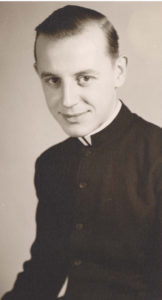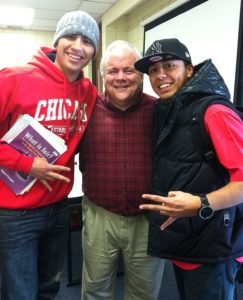 Br. Gerard Von Hagel, C.PP.S., who at the time was the assistant to the academic dean at Saint Joseph’s College in Rensselaer, Ind., listened carefully as a student told him he was discerning a vocation as a religious brother. The student was looking at several religious communities, but not the Missionaries of the Precious Blood, though he liked and admired them. He knew he also wanted to be a teacher, and he saw the C.PP.S. brothers of that time primarily supporting their community in other ways, out in the farm fields of the college or in its machine shop.
Br. Gerard Von Hagel, C.PP.S., who at the time was the assistant to the academic dean at Saint Joseph’s College in Rensselaer, Ind., listened carefully as a student told him he was discerning a vocation as a religious brother. The student was looking at several religious communities, but not the Missionaries of the Precious Blood, though he liked and admired them. He knew he also wanted to be a teacher, and he saw the C.PP.S. brothers of that time primarily supporting their community in other ways, out in the farm fields of the college or in its machine shop.
Br. Gerard told the student that there was a group of brother candidates coming up who were also dreaming of different ways to be brothers to the world. He told the student there would be many ways he could live out his life as a C.PP.S. brother, including teaching.
The student, a kid from New Jersey whose name was Ben Basile, took in Br. Gerard’s words. They’d become friends on campus through their mutual love of opera. Why not take a closer look at the C.PP.S.?
That was over 50 years ago. Br. Ben Basile, C.PP.S., was professed a brother in 1969 and has lived out his dream of teaching, helping hundreds or maybe thousands of students find their way first through their high school years, then college.
He still credits Br. Gerard with helping him see where he might fit into this Community. Br. Gerard took on that role for many C.PP.S. brothers, and even in the Community itself, as it struggled to redefine the role of and possibilities for brothers.
“Gerard was on the forefront of whatever was changing for brothers in those years,” Br. Ben said. Br. Gerard worked for brothers to have more freedom in their vocation not only in this Community, but for religious brothers nationally. He also represented the brothers, though he could not vote, at the General Assembly in 1969, where the Community rewrote its constitution/statutes, which would include, among other reforms, a new understanding of the brothers’ role in the Community.
Brothers had been an essential part of the C.PP.S. from its founding, but theirs had been primarily a supporting role as they worked in Community houses and in its farm fields. Br. Gerard helped foster and put forward a new understanding of the vocation, helping others see that brothers could minister in many ways, including as teachers, musicians, chaplains and in parish ministry.
As with most fundamental changes, it wasn’t easy. “We brothers went through struggles among ourselves for a lot of years,” Br. Ben said. “There were the working brothers and the ones who were going to school. We were called ‘postulants’ back then. There was a little bit of tension between guys who were going to school and the guys who were working in the carpenter shop and outside, even though we all had some work (manual labor) to do on Wednesday afternoons and Saturday mornings. That was part of our formation at the time.
“The struggle for the guys who were already in the Community (as they looked at the postulants in college courses) was, what was this saying about their lives? Here are these guys coming in who were not going to be manning the institutions anymore.” What did this say about the older brothers’ identity and the younger brothers’ vocation?
Br. Gerard had a uniquely four-square way to come at that identity crisis. “Gerard had a vision for us. He really worked with us to live a community life. He articulated to us that that was a brother’s vocation: a brother’s call is to community, no matter what apostolic call we had. We were not brothers unless we were involved in community, because that’s the very essences of being a religious brother. Your community life sustains your apostolic call.”
 That’s certainly been true for Br. Ben. He served at Brunnerdale, the Congregation’s former high school seminary near Canton, Ohio, and for 11 years, first as a teacher then as principal, a new role for a brother. He has ministered at Calumet College of St. Joseph, in Whiting, Ind., which is sponsored by the Missionaries of the Precious Blood, for 37 years. Music ministry—remember, opera was the foundation of his friendship with Br. Gerard—has also been an important part of his life.
That’s certainly been true for Br. Ben. He served at Brunnerdale, the Congregation’s former high school seminary near Canton, Ohio, and for 11 years, first as a teacher then as principal, a new role for a brother. He has ministered at Calumet College of St. Joseph, in Whiting, Ind., which is sponsored by the Missionaries of the Precious Blood, for 37 years. Music ministry—remember, opera was the foundation of his friendship with Br. Gerard—has also been an important part of his life.
Through all those years (he’ll celebrate his 50th anniversary in 2019), he’s learned that Br. Gerard was right, that Community gives his life its context.
“Our community lifestyle is much more fluid than a lot of religious communities, so we have to have some foundation. We’ve come to learn over the years that you have to work at it,” he said. “Take the group of members here (in Northwest Indiana), for instance. We live in different locations in the area. We have to work at getting together, keeping in contact. So the foundation has to be there, and it’s your identity with the Community. We are aware of what we owe the Community for the life that we’ve been given.”
At Calumet College, Br. Ben came full circle with Br. Gerard. They ministered together there near the end of Br. Gerard’s life. Br. Gerard served as its alumni director. “He ran it on a shoestring budget, but he worked it,” Br. Ben said. The college hands out the Br. Gerard Von Hagel Distinguished Alumni Award each year.
He was the same at the end as he was at the beginning, Br. Ben said. “Br. Gerard was steadfast. He knew what he was about. There was a certain solidness to him. He was a man of prayer. And he was nobody’s pushover; he was always his own guy. We liked that about him. That was a model for us: you had to hold on to your own vision, work your own vision, and it had to be grounded in community and in religious life.”
Br. Gerard could put on a gruff exterior that hid (barely) his soft heart. One group of postulants called him “the iron chancellor,” partly in jest, because Br. Gerard knew what he wanted and knew how to get it, but he always had the students’ best interests at heart.
Br. Ben certainly saw that in him. He knew him as a formator, and then, when they were living together while in ministry at CCSJ, “I ended up being his director for a number of years,” Br. Ben said. “I remember one day when he announced at supper that he was fully retired. I said without blinking an eye, ‘Gerard, who could tell?’
“He looked at me and said, ‘My Gawd, where did I go wrong?’”
But in preparing a new generation of brothers for ministry and community life, he didn’t go wrong. He did what he was called to do. He did right by them.
